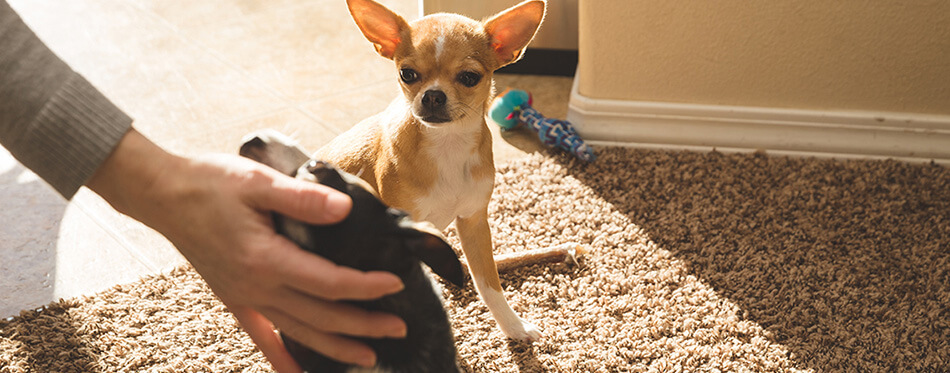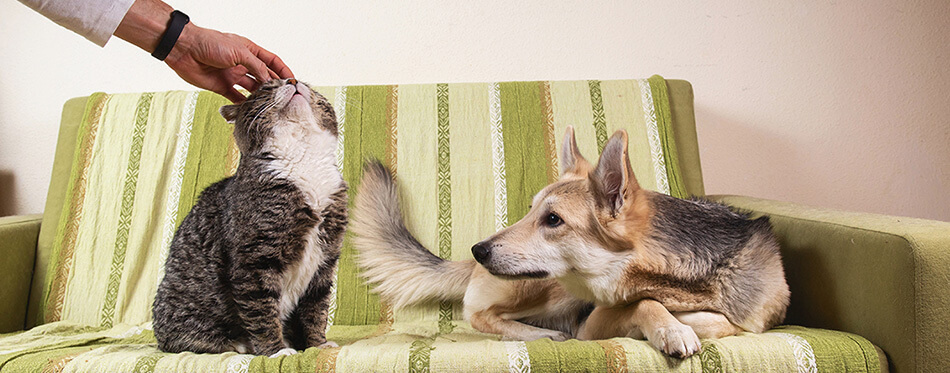Time and again, we see pet parents asking “can dogs get jealous?” after witnessing some jealous behavior from their pup. Whether it’s due to a fake dog on a viral video, through to general jealous behaviors exhibited by a possessive dog – there are many dog owners who don’t understand why their dog behavior changes so suddenly and showing so much aggression.
Referred to as secondary emotions, jealousy itself relates more to sadness and anger, rather than being a primary emotion, it’s interesting to see how a pet can have complex emotions. However, dog jealousy doesn’t mean you’ll be stuck with pushy behavior or aggressive behavior for the rest of your life. Indeed, how you, as their human companion, interacts with others and reinforces or corrects this behavior is key.

Why Do Dogs Get Jealous?
Dogs experience jealousy for a wide range of reasons, in the same way that a person does. Sometimes, it comes down to spending a lot of time with one person, and then suddenly being introduced to another. Indeed, many dogs and new pets become extremely attached to their dog owners, firmly believing that their pet owners belong to them.
However, these jealous behaviors don’t just come from the introduction of other humans or pets. There are actually many reasons within this, which cause your dog to feel jealous. Dogs exhibit jealous behavior when they see their owner with what they deem as a potential rival.
This can be closely related to feeling jealous of others receiving food or affection, as you would expect from your pet. But other jealousy-inducing situations include a change in routine, a new home, a new owner, a new family member (most commonly a new baby or partner), or any perceived social rival which takes away from their individual attention.
How do You Know When Your Dog is Jealous?
Depending on the circumstances, there are a few ways you can tell that your dog is dealing with jealousy/ Some of the most common signs of jealousy in dogs including the following:
Aggression
This doesn’t necessarily need to be a nasty level of aggression – but there would certainly be an increase in more assertiveness. Just like young humans, many dogs feel that any attention is good attention. So, these social animals may decide to give you a nip or even bite you, in order to get more attention.
Extra Affection
On the opposite end of the scale, some dogs let their owners know that they’re feeling jealousy by becoming extremely affectionate. Again, this comes down to gaining their owners’ attention, which dogs often do by licking their owner, or being as close to their owner as they can get.
Pushing Others Aside
Whether it’s other dogs or puppies, or other pets such as cats, dogs will often try to get between you and others, if they are jealous of them. Since you mentally represent the pack leader to dogs, the way you respond to this is key to changing the behavior toward another pet or person.
Do Dogs Get Jealous of Other Dogs?
Absolutely. In fact, new research into the behavior of dogs highlights that dogs become even more jealous over other dogs than they do about other humans. Researchers found that the jealousy over their pet parents attention and desire to remain closely linked to their humans may stem from a survival instinct.
In the study, owners were asked to play with three, different objects in front of their dog. The first item was a fake dog, which wagged its tail and barked when being played with. The second was a plastic jack-o-lantern. Owners were asked to complete the same task and pretend the lantern was the same thing, treating the item like another dog and playing with it. The final item was a kid’s book, which played songs. In this case, owners were asked to read this aloud, as if to a child.
The stuffed dog revealed how dogs respond very differently toward other dog toys and dogs, than they do with other items. Indeed, dogs were twice as likely to push their owner (showing the same behaviors as jealousy, from what we understand given the information above) with the stuffed dog, than they were with the lantern. And 25% of the dogs became aggressive with the fake dog.
As a side note: the experiment was later repeated with a fleece cylinder in lieu of the fake dog. In this experiment, the fleece cylinder caused the dogs to respond more calmly than when the fake dog was used.
The research was carried out by Christine Harris and Caroline Prouvost from the University of California, San Diego. And highlights the importance of paying attention to a dog’s self-awareness, as well as spotting the signs of a dog when they experience jealousy.
While this study shows clear feelings of jealousy in dogs, some owners may still not be aware of this. And, while the stuffed dog and fake dog in this scenario got away relatively unscathed, it does go to show how dogs and puppies may respond to jealousy, too.
Of course, this behavior can be trained out of dogs – but it’s always worthwhile to remember that envious dogs can become aggressive. Especially if they’ve never experienced this before and are used to spending time with their human one-on-one.
Do Dogs Get Jealous of People?
Again, humans are not the only species that can feel jealousy when it comes to other people. Dogs can absolutely get jealous of people. If your dog is constantly trying to get between you and your partner, or snarls/growls at another person when they come near you, the likelihood is they’re feeling envious of the attention that individual is receiving.
For this reason, you should never leave a dog unattended near children or babies. What may occur out of sight could be completely harmless – but it could also lead to disaster. This is especially true if either party has food or treats. Whether it’s one dog or multiple pets in one area, the risk is too great.

How do you Stop a Dog From Being Jealous?
Like all things with dogs, stopping aggressive behavior in your dog comes down to training. One of the most common jealousy behaviors seen in the aforementioned study is that dogs pulled on leads to get closer to their owner. Similarly, dogs pulled against items too, to encourage their human to ignore it.
So, starting with the basic training is key. Using a treat that your dog loves and be sure to use this as a reward for good behavior. Since training helped to reinforce the bond between you and your dog, even the basics can help reduce the level of jealousy your dog feels.
As an example, if your dog is jealous of your cats, or one dog is resentful toward another, use a reward (it could be a treat or it could be your attention) as leverage. So, when your dog acts needy when you’re busy, completely ignore their actions.
Meanwhile, a good way to avoid problems when there’s a new baby in the house is to act proactively. For example, taking the blanket from the babies room and allowing your dog to smell it, before giving them a treat for acting calm, is a great way to desensitise your pup to changes.
What is the Most Jealous Dog Breed?
The French Bulldog is one of the most renowned dog breeds for jealousy and desperately trying to seek attention. Bred to be companion dogs, these pups have a tendency to get in between lovers, family members and other pets. Not to mention they love to get as much attention as they possibly can!
Final Words
While it can seem disconcerting to have an aggressive dog nearby, the key is not to panic. Most dogs are only responding to the most basic stimulus and training your pup out of this behavior will come easily – as long as you’re firm but fair. Be sure to help puppies with training from a young age and do seek help from a trained professional if you’re becoming increasingly concerned about your dog or their behavior toward you or others.

